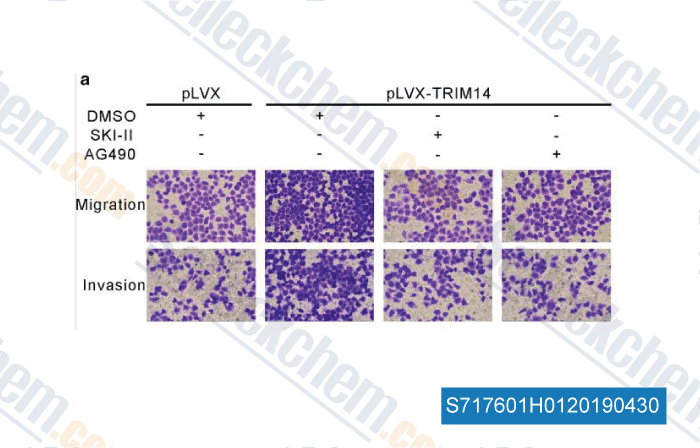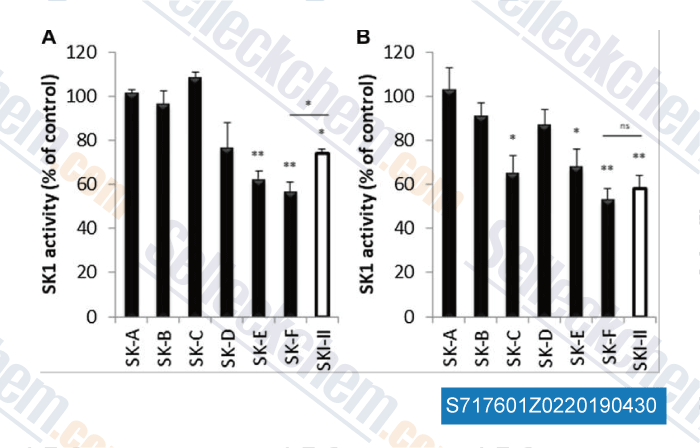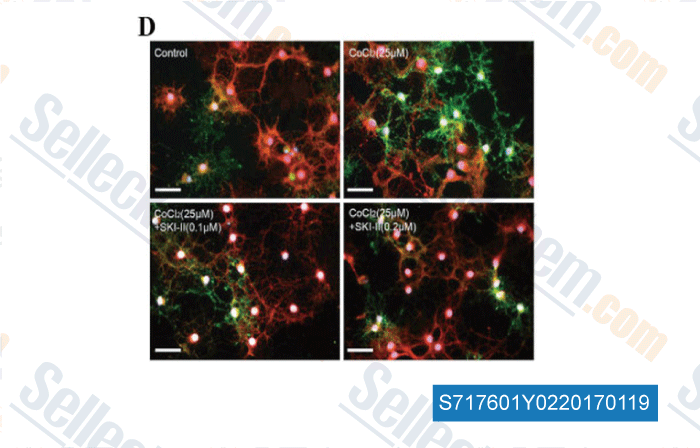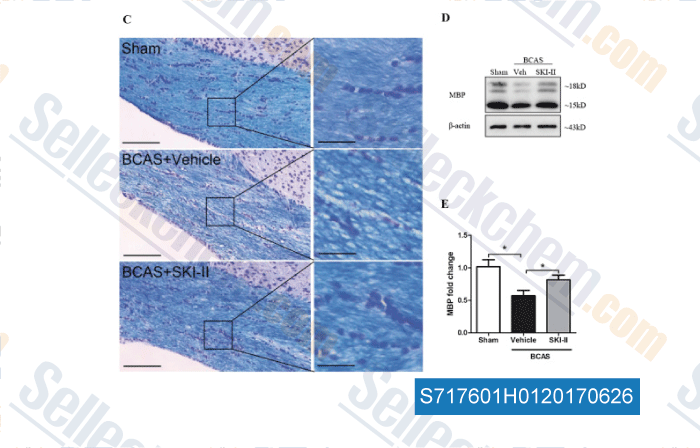|
How to Cite 1. For In-Text Citation (Materials & Methods): 2. For Key Resources Table: |
||
|
Toll Free: (877) 796-6397 -- USA and Canada only -- |
Fax: +1-832-582-8590 Orders: +1-832-582-8158 |
Tech Support: +1-832-582-8158 Ext:3 Please provide your Order Number in the email. We strive to reply to |
Technical Data
| Formula | C15H11ClN2OS |
||||||
| Molecular Weight | 302.78 | CAS No. | 312636-16-1 | ||||
| Solubility (25°C)* | In vitro | DMSO | 61 mg/mL (201.46 mM) | ||||
| Ethanol | 61 mg/mL (201.46 mM) | ||||||
| Water | Insoluble | ||||||
| In vivo (Add solvents to the product individually and in order) |
|
||||||
|
* <1 mg/ml means slightly soluble or insoluble. * Please note that Selleck tests the solubility of all compounds in-house, and the actual solubility may differ slightly from published values. This is normal and is due to slight batch-to-batch variations. * Room temperature shipping (Stability testing shows this product can be shipped without any cooling measures.) |
|||||||
Preparing Stock Solutions
Biological Activity
| Description | SKI II (SphK-I2) is a highly selective and non ATP-competitive sphingosine kinase (SphK) inhibitor with IC50 of 0.5 μM, while this compound exhibits no inhibitory action on other kinases including PI3K, PKCα and ERK2. | ||
|---|---|---|---|
| Targets |
|
||
| In vitro | SKI II potently inhibits endogenous SK activities in the breast cancer cell line MDA-MB-231. This compound demonstrates significantly antiproliferative effects in human cancer cell lines including T-24, MCF-7, MCF-7/VP, NCI/ADR with IC50 of 4.6 μM , 1.2 μM, 0.9 μM and 1.3 μM, respectively. It also induces apoptosis of T24 cells consistent with the hypothesized consequence of reducing S1P levels. As demonstrated previously in MDA-MB-231 cells, this chemical decreases S1P formation in JC cells in a concentration-dependent manner, with IC50 of 12 μM. |
||
| In vivo | SKI II (50 mg/kg) after intraperitoneal or oral administration significantly decreases tumor growth a syngeneic Balb/c mouse solid tumor model that uses JC mammary adenocarcinoma cells relative to control groups with no overt toxicity or weight loss. This compound (50 mg/kg ip) ameliorates antigen-induced bronchial smooth muscle hyperresponsiveness in mice by endogenously inhibiting generation of S1P. |
Protocol (from reference)
| Kinase Assay: |
|
|---|---|
| Cell Assay: |
|
| Animal Study: |
|
References
|
Customer Product Validation

-
Data from [ , , Cancer Cell Int, 2018, 18:202 ]

-
Data from [ , , Breast Cancer Res Treat, 2018, 172(1):33-43 ]

-
Data from [ , , Neurochemistry International, 2016, 94: 90-97. ]

-
Data from [ , , Neurochem Int, 2016, 94:90-7 ]
Selleck's SKI II Has Been Cited by 17 Publications
| Extracellular vesicles isolated from SphK1 inhibitor SKI II-medium restrain the migration of colorectal cancer [ Transl Cancer Res, 2025, 14(5):2594-2602] | PubMed: 40530117 |
| The central role of Sphingosine kinase 1 in the development of neuroendocrine prostate cancer (NEPC): A new targeted therapy of NEPC [ Clin Transl Med, 2022, 12(2):e695] | PubMed: 35184376 |
| The sphingosine kinase inhibitor SKI-V suppresses cervical cancer cell growth [ Int J Biol Sci, 2022, 18(7):2994-3005] | PubMed: 35541904 |
| The anti-osteosarcoma cell activity by the sphingosine kinase 1 inhibitor SKI-V [ Cell Death Discov, 2022, 8(1):48] | PubMed: 35115496 |
| Proteomic-Based Approach Reveals the Involvement of Apolipoprotein A-I in Related Phenotypes of Autism Spectrum Disorder in the BTBR Mouse Model [ Int J Mol Sci, 2022, 23(23)15290] | PubMed: 36499620 |
| MAPK activity dynamics regulate non-cell autonomous effects of oncogene expression [ Elife, 2020, 9e60541] | PubMed: 32940599 |
| Follicle-stimulating hormone promotes the proliferation of epithelial ovarian cancer cells by activating sphingosine kinase [ Sci Rep, 2020, 10(1):13834] | PubMed: 32796926 |
| The Intra-nuclear SphK2-S1P Axis Facilitates M1-to-M2 Shift of Microglia via Suppressing HDAC1-Mediated KLF4 Deacetylation. [ Front Immunol, 2019, 10:1241] | PubMed: 31214192 |
| Acid ceramidase promotes drug resistance in acute myeloid leukemia through NF-κB-dependent P-glycoprotein upregulation. [ J Lipid Res, 2019, 60(6):1078-1086] | PubMed: 30962310 |
| TRIM14 promotes colorectal cancer cell migration and invasion through the SPHK1/STAT3 pathway [Jin Z Cancer Cell Int, 2018, 18:202] | PubMed: 30555277 |
RETURN POLICY
Selleck Chemical’s Unconditional Return Policy ensures a smooth online shopping experience for our customers. If you are in any way unsatisfied with your purchase, you may return any item(s) within 7 days of receiving it. In the event of product quality issues, either protocol related or product related problems, you may return any item(s) within 365 days from the original purchase date. Please follow the instructions below when returning products.
SHIPPING AND STORAGE
Selleck products are transported at room temperature. If you receive the product at room temperature, please rest assured, the Selleck Quality Inspection Department has conducted experiments to verify that the normal temperature placement of one month will not affect the biological activity of powder products. After collecting, please store the product according to the requirements described in the datasheet. Most Selleck products are stable under the recommended conditions.
NOT FOR HUMAN, VETERINARY DIAGNOSTIC OR THERAPEUTIC USE.
